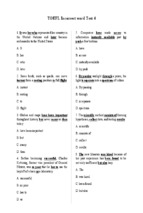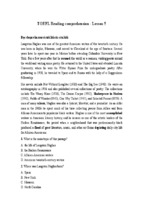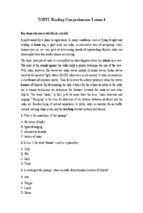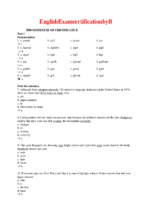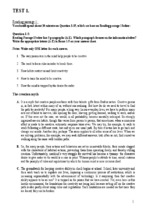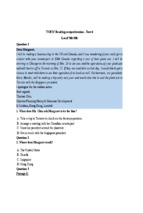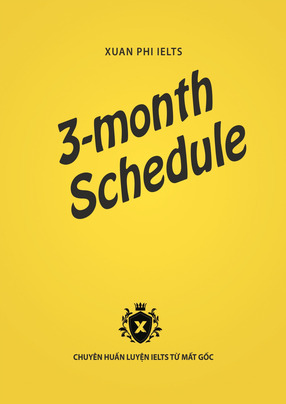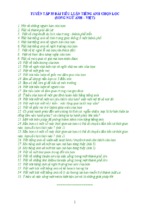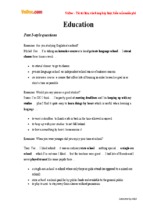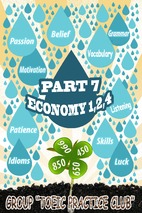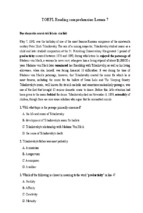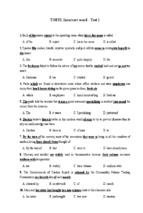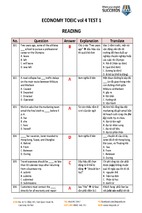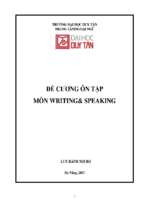Unlock your English with…
English
Unlocked!
Advanced (C1)
student course book
f top tips
Plus lots orning!
for lea
www.hotenglishmagazine.com
ses
Clas
from
LY
ON
€9
!
Learn
English…
l!
a
ateri
m
+
LEARN ENGLISH
OVER THE
PHONE!
…with Hot English telephone classes!
Native English teachers just a phone call away.
Access to the very best materials through our Student’s Area.
Structured classes with clear objectives per class/month/year.
Very competitive prices from just €9 per class.
Choose your timetable from 7am - 10pm (CET).
But don’t take our word for it, try out a...
...and then choose one of the four courses from below.
1 IMPROVE YOUR
SPOKEN ENGLISH
®
®
2 LEARN
BUSINESS ENGLISH
TRIAL LESSON
3 BE SUCCESSFUL
AT JOB INTERVIEWS
4 PASS
YOUR EXAMS
(00 34) 91 455 0273
telephone-english
[email protected]
www.telephone-english.com
WHAT IS ENGLISH UNLOCKED!?
1
Word building
Build your vocabulary with
1,000s of the most powerful
and useful words and
expressions.
2
Read & respond
3
Word linking
4
Listen & respond
5
Pronunciation perfection
6
Read interesting, up-to-date
articles, and then answer the
questions and check your
understanding.
Learn about combining words
to form expressions, phrases
and sentences.
Listen to recordings of
native-English speakers,
then answer the questions to
see how much you’ve really
understood.
Perfect your English
pronunciation so people can
understand what you’re saying!
Speaking gym (optional)
Practise everything you’ve
learned! Talk to a nativeEnglish speaking teacher on
Skype or by telephone. See
below for details.
5
Speaking gym
(optional
upgrade)
4
Pronunciation
perfection
3
Listen
& respond
2
Word linking
1
Read &
respond
Word building
Learn and improve your English in just 32 days! English Unlocked! uses the powerful Six-Key SystemTM
6
Your
English
Unlocked!
PLUS! English Unlocked! is full of top tips on how to speed up
your learning!
PLUS PLUS! The Language-to-go phrases at the end of each
section will give you lots of useful language to cut out and use NOW!
What’s the Speaking Gym?
You want to speak English, right? We understand! Languages are
made to be spoken! Speaking Gym is a powerful add-on to the
English Unlocked! course. It lets you speak to a native Englishspeaking teacher so you can practise the English you’ve learned.
How? Easy! By Skype or telephone. By regularly speaking English
with a native teacher, your English will improve much faster. See
www.learnhotenglish.com/speaking-gym for more information.
But is English Unlocked! right for my level?!
English Unlocked! is perfect for all English-learning levels. Simply
choose the English Unlocked! course book that’s right for you. And
when you’ve completed it, you can go up to the next level!
There’s an English Unlocked! course for each of these six levels:
Beginner (A1)
Elementary (A1-A2)
Pre-Intermediate (A2)
Intermediate (B1)
Upper Intermediate (B2)
Advanced (C1)
Want to know your level? Take our English level test at
www.learnhotenglish.com/leveltest
Great! But how long will English Unlocked! take?
English Unlocked! gives you 64 hours of powerful English learning!
Complete a course in 32 days with just two hours a day, or faster if
you want! And once you’ve completed a course book, you go up to
the next level!
We guarantee that this is the best way to learn English.
And if you aren’t satisfied, we’ll give you your money back
ENGLISH UNLOCKED! ADVANCED
Copyright Hot English Publishing SL 2013 www.hotenglishmagazine.com
3
CONTENTS
Unit
Page
1
Problems & Solutions Objectives Word Building: Problems
8
2
Social Splash Objectives Word Building: Socialising
15
3
Legal Matters Objectives Word Building: Legal words
22
4
Money Matters Objectives Word Building: Money
Language structures: Prepositional verbs / Causative use of have
5
City Delight Objectives Word Building: City descriptions
36
6
Work Time Objectives Word Building: Work
43
7
Sales & Selling Objectives Word Building: Sales
50
8
Advert Alert Objectives Word Building: Advertising
Language structures: Collocations
Language structures: Passive structures / Phrasal verbs
Language structures: Conversational English / Idiomatic expressions
Language structures: Reporting Verbs
Language structures: Phrasal verb particles
Language structures: Idiomatic expressions
Language structures: The language of persuasion
Self-Assessment
TERM 1 Progress Test
4
ENGLISH UNLOCKED! ADVANCED
Copyright Hot English Publishing SL 2013 www.hotenglishmagazine.com
29
57
64
65
ADVANCED
INDEX
Unit
Page
9
Let’s Complain! Objectives Word Building: Complaining
67
10
In the News! Objectives Word Building: Newspaper stories
74
11
Travel Time Objectives Word Building: Travel
Language structures: Phrasal Verbs
81
12
Film Fantastic Objectives Word Building: Film
Language structures: Linking words & Opinion adverbs
88
13
14
Language structures: Prefixes & Suffixes
Language structures: Synonyms & Antonyms
That’s Incredible! Objectives Word Building: Mysteries
Language structures: Prepositions of Time, Place, Purpose & Movement /
Reflecting on the past
Communication! Objectives Word Building: Raising awareness
Language structures: Prepositional phrases
15
Success! Objectives Word Building: Power & success
Language structures: Preposition Review
16
Our Planet!
Objectives Word Building: In the wild
Language structures: Fronting & Compound nouns
Self-Assessment
TERM 1 Progress Test
95
102
109
116
123
124
Resource Section
Evaluation
125
Irregular Verbs
144
Answers
126
Punctuation
146
Audio scripts
134
Pronunciation of Past Tense verbs
147
Phonetic Table
143
Pronunciation
148
ENGLISH UNLOCKED! ADVANCED
Copyright Hot English Publishing SL 2013 www.hotenglishmagazine.com
5
UNIT
0
Getting started
Welcome to English Unlocked! for advanced-level (C1) students!
1
Profile analysis
“I’d describe
myself as
highly motivated. I’m the kind of person
who needs several projects on the go at
the same time. I’d love to start my own
business one day. I’m really into sport
Read over the profile. Then, complete the table.
Jennifer Reed
Managing Director
Company: EuroGlobalNet
Industry: Financial services
Don’t worry too much about making
“mistakes”. Even native speakers
get things wrong when speaking. It
happens when you’re talking fast and
trying to communicate a message. The
important thing is being able to correct
yourself, and being able to identify any
mistakes in your written work.
and film.” Megan 27
“I’m a really methodical person. I’d
say that attention to detail is one of my
key skills and that’s why accounting
is just perfect for me. I’m a bit of
a bookworm and can get through
about 10 books a month.” Abbie, 26
Statement
I’ve been working in finance for
the past six years, but I’m looking
to change professions in the
near future. I’d describe myself
as hard-working, committed
and extremely focused. I love a
challenge and I’m happy when
I’m in a dynamic environment. In my free time, I
play hockey in a team, and regularly go swimming,
sailing and skiing. I also like watching films, cooking
and reading. Twice a month, I do some charity work,
helping out in a young person’s charity.
“I’d describe myself as pretty ambitious
and I’m determined to reach my full
potential professionally speaking.
I really enjoy holding positions of
responsibility and being involved in the
decision-making process. I do a lot of
photography in my free time.” Jack, 32
Profile
Fluent speaker of English, French, German and
Chinese.
Lived and worked in England, China, Australia and
the USA.
Some of the companies I’ve worked for: Prockwell and
Gardiner, Watermans PLC and Euro Holiday Zones.
“I love being part of a group and
getting involved in projects with
other people. I’m quite good at
managing people too, and often lead
teams at work. When I’m not in the
office, I love working out in the gym
or meeting up with friends.” Harry, 33
“I’m a problem-solver and a good
negotiator. I do a lot of business
with overseas investors. I find it
fascinating dealing with people
from different cultures. I spend a
lot of my time outside work writing
1. Name
2. Career industry
3. Self-description
4. Free time activities
5. Charity work
2b
6. Languages
Your turn!
Write a short description of yourself.
2a
Character descriptions
Read the descriptions. Then, write a name next to each statement.
1. She loves reading.
2. She wants to set up her own business.
3. He’s a people-person.
4. Her job is perfect for her.
5. She often comes into contact with people from other
countries.
6. She likes sport and cinema.
7. He takes photos in his free time.
6
and travelling.” Melissa,
31
Language
Find a word or expression in the text that means...
1. ...you really like something = I’m really
2. ...you do things carefully and thoroughly. =
3. ...you love reading = I’m a bit of a
.
4. ...you want to go far in life. = I’m really
.
5. ...to do exercise. = To
6. ...from another country. =
3
Conversation analysis
it.
.
Read over the conversation. Then, answer the questions.
Kate and Jack, two old acquaintances, have just met up at a
conference.
Kate: Hi, it’s Jack, isn’t it?
Jack: That’s right. You’re Kate Brooks, aren’t you?
Kate: Yes, that’s it.
ENGLISH UNLOCKED! ADVANCED
Copyright Hot English Publishing SL 2013 www.hotenglishmagazine.com
Jack:
Kate:
Jack:
Kate:
Jack:
Kate:
Jack:
Kate:
Jack:
Kate:
Jack:
Kate:
Jack:
1.
2.
3.
4.
5.
6.
We met in Brussels, didn’t we?
Yes, at last year’s conference. So how are things?
Pretty busy. How about yourself?
Not too bad. You were living in Sweden, weren’t you?
Yes, still there.
So, what’s that like?
Pretty good, actually. The wife and kids are settled in
now. My wife’s working for a local firm, and the children
are really enjoying school now that they’ve made some
friends and picked up a bit of the language. You were
living in Italy last time I met you, weren’t you?
Yes, that’s right.
So, how’s your Italian coming along?
Not too bad. I can’t get by pretty well now. I did a course
a while ago, and I can more or less follow the news and
read a paper, so that’s good, at least. The problem is,
most of the people I deal with speak perfect English so
it’s hard to get a chance to practise.
I know what you mean. It’s the same in Sweden. Oh,
well, it was nice to catch up with you. Hope to see you
again soon.
Next year's conference, probably.
Exactly! Bye.
10. Sally: “I’ll be there later.” She told us that she
. (Reported Speech)
(talk) to me like that,
11. If someone
(report) them to the authorities.
I
(Second Conditional)
(spend) more time on it, it
12. If you
(be) a lot better. (Third Conditional)
5
Vocabulary
6
Anecdote analysis
Write 4 more words/expressions for each word group.
1. Law: suspect, alibi, court, trial...
2. Character descriptions: selfish, ambitious, greedy...
3. Business: profit and loss, sales target, breakeven point...
4. Cinema: soundtrack, trailer, script...
5. Jobs: badly-paid, rewarding, dangerous, challenging...
6. Natural disasters: drought, earthquake, bushfire...
Read over the story. Then, answer the questions.
The mobile phone
I was sitting on a train
once when I noticed
this mobile phone
on the floor. I looked
around but I couldn’t
see anyone nearby who
could have dropped it.
After about ten minutes,
I decided to pick it up. It looked quite new and it
was still on. Curious to see who might have dropped
it, I scrolled through the address book and opened
a text message but it was in a language I couldn’t
understand. Eventually, I decided to send a message
in English to a couple of the names in the phone
book. I wrote, “Please tell the owner of this phone
to call me” then I added my mobile number. I didn’t
hear anything for a while, but just as I was getting off
the train, the phone rang. I answered and a woman’s
voice in English said, “Hello, I think you've got my
phone!” I explained what had happened and she
asked me to wait at the station café so she could
come and pick up the phone. An hour later she
arrived. And that’s how I met my wife, Olga.
Where had Kate and Jack met before?
Where’s Jack living now?
Why is he happier there now?
Where’s Kate living?
How is her Italian coming along?
What have they both found that makes it hard to
improve their language skills?
Your turn!
Write a dialogue between two ex-colleagues who’ve just bumped
into one another.
4
Verb tenses
Complete the sentences with the correct forms of the verbs in brackets.
(prepare). (Present Passive
1. The food
Continuous)
(walk) in the park it
2. As I
(start) to rain. (Past Continuous and
Past Simple)
(publish) in all the
3. The stories
major newspapers. (Present Perfect Passive)
(work) really hard recently. (Present
4. I
Perfect Continuous)
(should / tell) me that you were
5. You
vegetarian. (Perfect Modal Verbs)
(finish) the work by 7 pm
6. We
tonight. (Future Perfect)
(lie) on a beach in the
7. She
Caribbean next week. (Future Continuous)
(send) later this
8. The e-mails
afternoon. (Future Passive with “will”)
(decorate) in blue.
9. The rooms
(Future Passive with be + going to)
By Alex
1.
2.
3.
4.
5.
What did Alex notice on the floor?
Why did he scroll through the address book?
When did the phone ring?
Where did they arrange to meet?
What did Alex and Olga do eventually?
Your turn!
Write a short anecdote or story about something that happened
to you. Invent if necessary.
ENGLISH UNLOCKED! ADVANCED
Copyright Hot English Publishing SL 2013 www.hotenglishmagazine.com
7
UNIT
Objectives
1
Problems & Solutions
In this unit, you’ll learn how to…
Use idiomatic expressions, use phrasal verbs to talk about problems,
identify weak sounds in speech, use passive structures in news reports
1
“Annoying things” ranking
Tick three of the things that you find annoying.
You lose your mobile phone.
You can’t get in touch with someone you need to
speak to urgently.
You get cut off during an important telephone
conversation.
You don’t have mobile phone coverage when you
need to make an urgent call.
You get stuck in traffic on the way to an important
meeting.
You get lost while trying to get to an important
meeting.
You’ve got so much work to do that you don’t have
time for lunch.
You have to take work home at night or at the weekend.
You lose your house keys.
You can’t find a receipt for an item of clothing that
you want to return.
The photocopier gets jammed as you’re printing
something really urgent.
Your computer crashes and you lose work.
Think about it!
Have any of these things happened to you lately? What else would
you add to the list? How frequently do these things happen to you at
work? Can you think of possible solutions to any of these problems?
What other annoying things happen at work?
8
ENGLISH UNLOCKED! ADVANCED
Copyright Hot English Publishing SL 2013 www.hotenglishmagazine.com
With just 20 minutes a day, you can
really improve your English. Read for
10 minutes (an online article, a graded
reader, etc.), and listen for 10 minutes
(a YouTube video, the news, your
favourite TV series, etc.). You’ll soon
notice the difference!
UNIT
1
Problems & Solutions
Vocabulary: Problems
1
Text messages analysis
Write the mobile phone text messages in standard English.
Use the key below to help you with some of the abbreviations.
Warning: some words have been misspelt. For example: internt
(which should be internet).
1. internt. nt working + i cant send docs u
need. wil do 2nite fm home
2. closd door w keys inside. need u 2 get me
# 4 locksmith asap
3. am @ home. cant find glasses. did u see
where i put them?
WORD BUILDING
a. Are more important than.
b. To allow something to begin.
c. A solution that only fixes the problem for a short
period of time.
d. To exclude from consideration; to ignore.
e. A temporary solution that you think of quickly.
f. To maintain neutrality in a dispute.
g. To accept or confront a problem.
h. To ignore a problem.
i. Thought of.
j. To take responsibility for a situation; to make yourself
open to criticism.
3
Take advantage of the sales and any two-for-one offers.
Cook large amounts of food and then freeze any leftovers for
busy nights.
Scrape out food jars to use the last little bit.
Eat out just once a month.
Base most of your meals on rice or beans to cut down on meat
consumption.
Cut out all fizzy drinks and stick to water!
Keep up on your car maintenance so it’s running as smoothly
and efficiently as possible.
Trade in any old electrical goods for more energy-efficient
ones.
Shop around for insurance. The rates can vary a lot!
Never leave the water running when rinsing dishes, brushing
your teeth, etc.
Split a starter or dessert with someone else when you go out
for dinner.
Take advantage of “get in free” days at the museum, etc.
Cut your own hair and do your own manicures.
Shop for Christmas gifts year round to avoid any pre-Xmas
price hikes.
Sell off any old items you don’t need on eBay or Craigslist.
Pay off any debts as quickly as possible. This saves on interest.
Use a spreadsheet to keep track of your variable expenses.
4. b.room flooded. sum1 left tap on. hav cald
plumber
5. need 2 get report frm ur computer. wot is
password?
6. no money in acct. u need 2 put sum in asap
as bils need paying
7. u wont beliv this but escapd jaguar from
zoo is in bk garden. com kwik! not 2 b mist
8. angry client demanding mony bk. not sure
wot 2 do. kan u com ovr 2 deal w it?
KEY
nt = not
pls = please
4 = for / four
u = you
# = number
w = with
bk = back
2 = to / too
@ = at
ur = your
sum1 =
someone
Your turn!
Write three text messages describing problems / emergencies.
Use text speak abbreviations where possible.
2
Matching
Match the expressions in bold (1 to 10) to the definitions (a-j).
1. It’s a short-term solution that won’t help us in the
long run.
2. They aren’t prepared to give it the go-ahead until a
full study has been carried out.
3. They’re just burying their heads in the sand.
4. They need to face up to the issues.
5. The pros definitely outweigh the cons in this case.
6. We shouldn’t rule out looking at alternative solutions
to this.
7. The government hasn’t come up with any viable
solutions to it.
8. It’s just a quick-fix solution that won’t help us in the
long run.
9. No one is prepared to stick their neck on the line any more.
10. They’re content to just sit on the fence.
Top tips for saving money
Read over the top tips for saving money. Tick the ones you do.
Afterwards, complete the expressions with the correct words.
1.
2.
3.
4.
5.
6.
7.
8.
Take advantage
something
at a restaurant
Eat
on something
Cut
something from your diet
Cut
for something
Shop
old items
Sell
any debts
Pay
something
Keep track
Your turn!
Write four top tips for saving money.
Think about it! Problems
What are your top tips for dealing with problems? Who do you turn
to when you’ve got a problem? What do you do when a problem
crops up?
ENGLISH UNLOCKED! ADVANCED
Copyright Hot English Publishing SL 2013 www.hotenglishmagazine.com
9
UNIT
1
Problems & Solutions
READ & RESPOND
HOW TO MANAGE YOUR
TIME EFFECTIVELY!
Y
ou may be able to manage money.
You may even be able to manage
people. But you won’t get far in life if
you can’t manage time.
1
Pre-reading
What are your top tips for
managing your time and
making sure you use it
effectively?
2
Reading I
Read the article once. Which
ideas on time management do
you like? Why?
3
Reading II
Read the article again. Then,
write a name next to each
question. Who…
1. ...learnt his time
management skills in
the army?
2. ...was a campaigner for
women’s education?
3. ...invented the World
Wide Web?
4. ...founded a stationery
business in London in
1796?
5. ...was concerned about
having enough time
to do everything he
needed to do?
6. ...had a best seller
called The Seven Habits
of Highly Effective
People?
7. ...thought that
executives should know
where their time is
being spent?
8. ...revolutionised the
automobile industry?
10
The need for time management skills was
first identified by Benjamin Franklin, one of
the Founding Fathers of the United States of
America. In his autobiography (published in
1791), Franklin described his daily schedule
in great detail. For example, evening would
include “supper, music or diversion or
conversation” followed by an “examination
of the day”. He was concerned about having
enough time to do everything he needed to do.
As he said, “Lost time is never found again.”
He’s also famous for saying, “Time is money!”
The next important figure in time
management was John Letts. Letts founded
a stationery business in London in 1796.
Many of his customers were in business and
they needed something to help them manage
their time more efficiently. In response, Letts
invented the diary. His invention was originally
used to keep track of stock movements, but
it was soon helping business people organise
their daily work. It was a great success and by
the 1820s, the diary had become something
that every entrepreneur had to have. John
Letts’ company is still in business today,
and about 22 million diaries, calendars, and
other products are produced every year.
In 1841, American woman Catherine
Beecher (1800-1878) published A Treatise
on Domestic Economy for the Use of Young
Ladies at Home and at School. Beecher was
a campaigner for women’s education and
was convinced that women could be just as
effective and competent as men. Her book,
which soon became a bestseller, also served
as a guide for time management. “It is the
right and duty of every woman to employ
the power of organisation… in order to gain
those advantages which are given to the one
sex and unjustly withheld from the other,”
she wrote.
Next came Henry Ford. His car production
lines provided a model of how time could
ENGLISH UNLOCKED! ADVANCED
Copyright Hot English Publishing SL 2013 www.hotenglishmagazine.com
be used efficiently. Nearly 200,000 Model T
cars were produced in the autumn of 1908,
and Ford changed the automobile industry
forever. “If everyone is moving forward
together, then success takes care of itself,” he
once said.
President Dwight D Eisenhower learnt
his time management skills in the army.
As president he had a system in which
tasks were divided into four categories.
1 “Urgent-important items”, which
were dealt with immediately. 2 “Urgentunimportant items”, which were delegated.
3 “Not urgent-important items”, which
were entered into a calendar. 4 And “Not
urgent-unimportant items”, which were
minimised or eliminated.
Peter Drucker’s book The Effective Executive
was published in 1966. According to
Drucker, the effective executive must:
Focus on results rather than work.
Build on strengths first, and then give
attention to areas of weakness.
Concentrate on areas where superior
performance will produce outstanding results
Make effective decisions.
Know where their time is being spent.
As he said, “Until we can manage time, we
can manage nothing else.”
1989 saw the invention of the World Wide
Web by Tim Berners-Lee. Suddenly, access to
information became quick and easy, saving
hours of research time.
And in 1989, Stephen Covey’s time
management best-seller, The Seven Habits of
Highly Effective People, was published. In it,
he said, “Most of us spend too much time
on what is urgent and not enough time on
what is important.”
So, do any of these theories and inventions
really help us manage time? It’s hard to say.
But in a recent survey by Hotmail, users voted
on the greatest time-saving device of all. And
the winner was... the washing machine!
UNIT
1
Language Structures:
Passive structures
2
We form passive structures with the verb to be in an
appropriate tense and the past participle of a transitive verb.
We use the passive when we want to focus on the events and
achievements rather than the people who are performing the
actions. The agent (the person who does the action) is
either unknown or not important. For example:
a) The award was presented to her during the ceremony.
b) The money has been handed in to the police.
We can form passives with the infinitive of the verb to be.
For example:
a) There’s a lot to be done, so we’ll have to get a move on.
b) It remains to be seen whether she can achieve all
she's set out to do.
We can use passive forms to create complex noun
groups. For example:
a) Being paid a monthly amount is much better.
b) Being given a new one to use for this job makes it
much easier.
We can also use passive -ing forms after verbs that are
normally followed by the gerund. For example:
a) I remember being taken there, but can’t recall what
happened afterwards.
b) She enjoyed being given an opportunity to show
what she was capable of.
We can also create informal passives with the verb to get.
For example:
a) We got taken to the station.
b) They got stuck in the lift.
1
WORD LINKING
Problems & Solutions
Photo analysis
Match the sentences (1 to 5) to the photos (a-e).
1. She doesn’t like to be kept waiting.
2. He can’t stand being told what to do.
3. I hate being charged for things I didn’t order.
4. I don’t like being disturbed while I’m on the phone.
5. She hates being interrupted while she’s talking.
Transformation
3
Comments completion
Transform these sentences from active to passive.
1. They were making the beds when we got there.
2. They’ll show us round the town later in the afternoon.
3. They need to do a lot before the deadline.
4. They’ll have edited the video by tonight.
5. We won’t send it until we’ve completed it.
6. They hadn’t told us what to do.
7. They’re going to restore the work of art.
Complete the comments with the correct participles.
What do you find annoying?
I hate it when you’re in a shop and you
to go to another
get (1)
counter after you’ve been waiting there
for ages.
I hate it when you get (2)
those dirty looks from waiters after you
leave a “small” tip.
It really annoys me when you get a
“Final Notice” letter telling you to pay a
bill that you know has already been (3)
.
I hate it at work when you’re (4)
waiting at a meeting
because someone’s late.
I can’t stand it when you’re (5)
to cover for someone who’s off sick, or
you’re obliged to take on extra work because
someone’s not in the office. That really gets me!
I can’t stand it when you do a good job and
for it, or worse,
you aren’t (6)
someone else takes the credit for it.
I hate it when you get (7)
something that isn’t your fault.
a
b
c
for
I hate it in a restaurant when you get
to a table right in the
(8)
middle when there are lots of other
better tables free.
Your turn!
d
e
Write a list of five things that you find annoying.
ENGLISH UNLOCKED! ADVANCED
Copyright Hot English Publishing SL 2013 www.hotenglishmagazine.com
11
UNIT
4
1
News stories analysis
We often use the passive in news stories. Read over the stories.
Then, answer the questions. Afterwards, see if you can identify any
passive structures. What tenses are they? Why are they being used?
Cash thrown from car in US chase
Suspected bank robbers threw wads of bank notes
from their vehicle as they were pursued by police
in Los Angeles yesterday. As the car weaved its way
through the streets, passersby rushed to collect the
money. The car eventually came to a halt at a busy
junction. Large crowds then gathered around the
getaway vehicle as the two suspects were taken into
custody.
World’s first colour moving pictures discovered
The world’s first colour moving pictures dating
from 1902 have been found by the National Media
Museum in Bradford after lying forgotten in an old tin
for 110 years.The newly-discovered films were made
by pioneer Edward Raymond Turner from London
who patented his colour process in March 1899. Now
the film has been restored by the National Media
Museum and is being shown to audiences for the first
time.
1.
2.
3.
4.
5.
6.
Who was throwing the money out of the car?
Who were they being chased by?
Who was picking up the money?
Where was the colour film discovered?
How long had it been there?
Who has the film been restored by?
Your turn!
Write a short news story. Use passive tenses where possible.
5
Phrasal verbs (problems)
Read over the definitions below. Then, complete the forum posts
with the correct participles (there are a couple not mentioned
below). Afterwards, see if you can identify any passive forms. Can
you find any phrasal verbs being used in the passive?
Deal with: if you have to “deal with” a problem, you have
to try to find a solution to it.
Take on: if you “take on” responsibility, you accept that
responsibility.
Break down: to reduce an idea into smaller, separate parts
to make it easier to understand or deal with.
Cross off (a list): if you “cross something off” in a list, you
delete it from that list.
Draw up (a list): if you “draw up” a list, you prepare it and
write it.
Stick to: if you “stick to” something, you continue doing /
using that thing.
Group together: if you “group things together”, you put
them into the same list / category, etc.
Pass on: if you “pass something on” to another person,
you give that thing to that person.
12
WORD LINKING
Problems & Solutions
Crop up: if something (a problem, for example) “crops
up”, it appears suddenly and unexpectedly.
Turn to: the person you “turn to” is the person you talk to
about a problem.
www.problemsolvers.com
Top tips
Send us your ideas for dealing with problems.
a list of all the things
You need to draw (1)
that need to be completed during the day. Then, you
as they’re completed.
can cross them (2)
Courtney
the list carefully and anything that
Go (3)
isn’t essential should be eliminated. Nigel
You should try not to be distracted during the day –
the task in hand.
stay focused and stick (4)
Harriet
Tasks should be analysed properly and a realistic
estimate should be given as to how much time will be
needed to get through them. Louise
into smaller parts
Tasks need to be broken (5)
so they can be dealt with more effectively. Max
You should deal (6)
the easier tasks
first and as quickly as possible. You’ll find this is a
motivating way to start tackling the work. Toby
. For
Similar tasks should be grouped (7)
example, e-mails should only be checked twice a day:
once in the morning and once before you leave. Reece
Anything that falls outside your area of responsibility
to someone else. You
should be passed (8)
have to be selfish at times! Nicole
Get up an hour earlier so you can try to catch (9)
on any work that you’re behind with. Ellie
If possible, problems should be dealt with as soon as
. The longer you leave them,
they crop (10)
the harder they are to resolve. Hannah
Turn (11)
someone for help if you’re finding
it hard to cope with all the pressure. Jack
Your turn!
Write three tips for dealing with problems. Try to use passive
structures.
ENGLISH UNLOCKED! ADVANCED
Copyright Hot English Publishing SL 2013 www.hotenglishmagazine.com
TRACK 1a
TRACK 1b
LISTEN & RESPOND
PRONUNCIATION PERFECTION
Willpower: the key to a successful
life!
Weak sounds
1
Listening I
What are the pros and cons of having good willpower (if you have
a lot of “willpower”, you can control yourself and our emotions)?
Make notes. Then, listen to the information once to compare your
ideas.
2
Listening II
Listen to the information again. Then, answer the questions in your
own words.
1. What was the Marshmallow Test?
2. What was discovered 20 years later?
3. What is the other experiment that is mentioned by
the author?
4. What was discovered in relation to this test?
5. What can you do if you don't have a lot of willpower?
6. In what practical ways can the book help you?
A
Many grammar words (such as prepositions and articles) have
strong forms and weak unstressed forms. We often use the strong
forms for emphasis in speech, or when we’re speaking slowly and
clearly. For example:
some
/: We would like some more, but not too
much.
And we use the weak, unstressed forms in fast, casual speech. For
example:
some
: We would like some more, but not too
much.
B
Listen and repeat these words with weak sounds.
to
: We went to the centre.
a
: I had a problem.
the
: I quite liked the first one.
has
: The plane has just arrived.
for
: We talked for an hour.
were
: They were waiting for you.
of
: I’d like a bit of it.
at
: We are at the front.
have
: They could have won.
C
Now listen to these sentences. Write S (Strong) or W (weak)
according to the pronunciation of the words in bold.
1. At least the work has been completed.
2. The rooms were being cleaned.
3. The cars are manufactured in this town.
4. The work will have been completed by Friday.
5. They were taken on a tour of the city.
6. She won’t be given enough time to finish it.
7. They’ve been paid for the work they did.
8. We should have been told that there was a problem.
ENGLISH UNLOCKED! ADVANCED
Copyright Hot English Publishing SL 2013 www.hotenglishmagazine.com
13
TRACK 1c
UNIT
1
LANGUAGE-TO-GO
Problems & Solutions
Learn these Useful Sentences. Suggestions: 1. Listen to the sentences and repeat them until you can say them fluently. 2. Study them
for a couple of minutes, then cover them up and try to re-write them in the right-hand column. 3. Write translations of the sentences.
Later, read over the translations and try to write them in English (without referring to the original versions). 4. Listen to a sentence,
then try to write it out on a piece of paper. 5. Cut out the table to carry with you and learn while you’re on the bus, train…
USEFUL SENTENCES
REVISION
1.
I couldn’t get in touch with her by phone so I left a message.
1.
2.
I got cut off during the phone call and had to call back.
2.
3.
We got stuck in traffic on our way home from work.
3.
4.
The photocopier got jammed as I was doing some urgent copying.
4.
5.
It’s a short-term solution that won’t help us in the long run.
5.
6.
They’re concerned about the amount of time they’re spending on it.
6.
7.
We shouldn’t rule out looking for an alternative solution.
7.
8.
The device was used to keep track of stock movements.
8.
9.
I remember speaking to her but I can’t recall what was said.
9.
10.
He had a system for dividing tasks into different categories.
10.
11.
I can’t stand it when you get blamed for other people’s mistakes.
11.
12.
I hate it when I get interrupted when I’m on the phone.
12.
13.
You should keep track of the amount of time you spend on it.
13.
14.
We’ll have to deal with this as a matter of urgency.
14.
15.
We’ve drawn up a list of possible candidates for the post.
15.
16.
The best thing would be to group these things together.
16.
17.
We need to break down the task into smaller units.
17.
18.
You can cross the first three items off the list.
18.
19.
We should stick to our current supplier for the time being.
19.
20. I don’t think I could take on any more responsiblity right now.
20.
Put ticks in the boxes:
I can do it well!
every
English words
Try to learn 10 k, you’ll have learnt 70,
day. In one wee t 300, and in a year
ou
in a month ab e average British person
er 3,000! Th cabulary of about
ov
has an active vo , it won’t take you
So
5,000 words. l the most important
long to learn al h.
terms in Englis
Speaking Gym!
Practise everything you’ve learned!
Talk to a native-English speaking teacher
on Skype or by telephone. Get your
speaking English classes from here:
www.learnhotenglish.com/speaking-gym
14
I can do it quite well!
I need to work on it!
Congratulations! You’ve completed a unit. Now you can…
Write some top tips for saving money.
Use phrasal verbs and passive structures
to write and talk about solving problems.
Write text messages with abbreviations.
Understand a recording about willpower.
Understand a text about time
management.
Identify weak sounds in spoken text.
ENGLISH UNLOCKED! ADVANCED
Copyright Hot English Publishing SL 2013 www.hotenglishmagazine.com
UNIT
Objectives
2
Social Splash
In this unit, you’ll learn how to…
Use expressions with get, identify several features of conversational English,
use personal discourse markers, understand some Engilsh slang
1
Listening is the key to language
learning. So, listen to English as much
as you can! Just ten minutes a day is
enough to really help you improve your
listening ability.
What are they saying?
Complete each speech bubble (1 to 8) with an appropriate word.
Where do you think these people are?
1. So, do
you fancy
some food to
take away?
3. I’ll get
.
You paid for
the meal!
2. Did you
a chance
to visit the
museum?
4. I’m sorry but I’ve got
to get
.
I’ve got an early start
tomorrow.
5. Interesting talk,
it?
6. You can’t
London without
seeing at least one
musical!
7. Actually, I think
I’ll just stick
8. So, do you
come here
sparkling water.
I’m driving.
?
Think about it!
Do you ever eat out with friends? Where do you go? Have you been
to a museum lately? Which one? What was it like? When was the last
time you went to the theatre? What did you see there? When was the
last time you ordered some food to take away? What did you have?
ENGLISH UNLOCKED! ADVANCED
Copyright Hot English Publishing SL 2013 www.hotenglishmagazine.com
15
UNIT
2
Social Splash
Vocabulary: Socialising
1
Comments analysis
Read over the mini-dialogues. Then, match the comments in bold
to the comments below (1 to 8).
1. Bad luck! =
2. Never! =
3. How cheeky! =
4. You’re a life saver! =
5. You’re joking! =
6. How annoying! =
7. I’m pleased (she’s) gone. =
8. I’m pleased! =
A: Nick got promoted to the management position.
B: You’re kidding! Sandra is way more qualified!
A: I’ve heard that they’re going to move us into another
office so we’ll be sharing with the sales team.
B: Over my dead body!
A: Have you heard that they’re replacing the HR
manager? She’s only been in the job for a couple of
weeks.
B: Good riddance! She’s caused nothing but trouble.
A: But I can’t possibly do that for you now. I’ve got to
finish this project, then I need to attend a meeting,
and then...
B: Tough luck! Make sure it’s on my desk before you
leave home today.
A: There’s a meeting at 6pm.
B: Oh, no, what a drag.
A: They ate all my biscuits that I had in the fridge!
B: What a cheek!
A: The meeting’s been cancelled.
B: Thank goodness for that. I’ve got so much work to do.
A: I’ve finished that work you gave me to do.
B: Thanks so much. I don’t know what I’d have done
without you.
2
Expressions with get
Read over the sentences with expressions with get (in bold). What
do they mean?
1. We went to Scotland last Friday. We often get away for
the weekend.
2. I worked at home all last Thursday. By 7 pm I was
desperate to get out of the house.
3. So, what have you been getting up to lately?
4. I know you’re really busy, but do you get the time to
do any exercise?
5. Do you get to see your friends much at the weekend?
6. Did you get a chance to go to look over the report?
7. I started a photography course a few weeks ago and
I’m really getting into it.
8. My car keeps breaking down. I’ve got to get rid of it.
9. She told a joke and everyone started laughing but
16
WORD BUILDING
I just didn’t get it.
10. They were looking for people to help organise the
conference, but I managed to get out of it.
11. We need to get some more milk.
3a
Mini-dialogues
Read over the mini-dialogues and say
where they’re taking place.
1. In a
A: Oh, I’m sorry but I wanted to get
some batteries too.
B: OK, I’ll just see if I can cancel the transaction. Erm let’s see, oh
sorry it’s already gone through.
A: Don’t worry I’ll pay for it separately with this card. Oh, hang on
a minute I think I’ve got it in cash. Here you are.
2. In a
A: I’m sorry but we couldn’t offer you
more than €700 for it.
B: You’re joking! I was hoping to get a
lot more than that.
A: Yeah, but look at the bodywork, all
those dents and scratches, plus it’s got more than 150,000
miles on the clock.
B: But it’s in perfect working order.
A: Look, I could offer you more for your old car if you agreed to
finance part of the new car through us. For example, if you
financed half the amount and paid it back over a period of
60 months, the interest rate works out at about 6.2%, and I
could get you €1,300 for trading in your old car in the form of a
discount off the total price for the new car.
B: Oh, right. Now you’re talking.
A:
B:
In a
What’s this?
I don’t know, you ordered it.
I suppose it must be that French
sounding thing.
Probably. Hey, have you got a spare
knife? Mine’s dirty.
Here, I’ll get one from this table over here.
So, did you hear what happened to Margaret?
No.
Got stuck in a lift for three hours last Saturday.
Really?
Yeah, can you imagine it? Three hours.... Oh, look, here come
our main courses. Shall we share?
No way! I don’t fancy what you’re having.
Oh, come on. It’s... [fades out]
3b
Language analysis
3.
A:
B:
A:
B:
A:
B:
A:
B:
A:
B:
Read through the dialogues again and find an expression that means...
1. Wait a second =
2. You can’t be serious =
3. That sounds a bit more interesting =
4. Never =
Your turn!
Write a short dialogue with two friends or colleagues chatting in
an informal setting. Try to include some expressions with get.
ENGLISH UNLOCKED! ADVANCED
Copyright Hot English Publishing SL 2013 www.hotenglishmagazine.com
UNIT
1
2
Pre-reading
What are some of the key skills
you need to develop in life:
public speaking, learning a
language, etc.? Make notes.
2
Reading I
Read the article once and
compare your ideas from the
Pre-reading task. Do you agree
with the list of ten key skills
to develop? What other ideas
would you add to the list?
3
READ & RESPOND
Social Splash
Reading II
Read the article again. Then,
answer the questions.
1. Apart from being
able to produce
grammatically-correct
sentences, what other
skills are required to
write well?
2. Why is networking
important?
3. Why is it important
to be able to evaluate
data?
4. What can help you
make better decisions?
5. Why are basic
accounting skills
important?
6. Why is it important to
relax?
10 TIPS ON HOW TO
SUCCEED IN LIFE
W
hat does it take
to succeed in life?
Author Dustin M.
Wax has compiled a list of
the top ten skills you need for
a successful life.
1 The ability to speak clearly,
persuasively and forcefully in
front of an audience is a key
skill and one that everyone
should develop.
2 Good writing skills are
also essential for today’s
competitive job market. But
writing well isn’t just a case
of producing grammatically
correct sentences – it
involves an ability to
organise your thoughts, as
well as being able to target
your ideas to an audience
in the most effective way
possible.
3 Strong organisational
skills are also key, as
is a strong sense of
discipline and an ability to
set objectives and meet
deadlines.
4 Networking is essential
for finding jobs and clients,
but it can also help you put
together effective teams for
developing ideas.
5 Being able to evaluate
data is an important
skill too. With so much
information out there, you
need to be able to sort the
potentially valuable from
the trivial, to analyse its
relevance and meaning,
and to relate it back to other
information.
6 Analysing information
is all very well, but at some
stage you also need to make
a decision. Over-analysing
can lead to indecisiveness,
so you need to learn how
to respond quickly and
effectively, and to know
what to do based on the
information available.
7 An ability to work quickly
with figures in your head,
to make rough but fairly
accurate estimates, and to
understand things such
as compound interest and
basic statistics are essential
for helping you make better
decisions.
8 You don’t have to know
everything, but you should
be able to find out what
you need to know quickly
and painlessly. This means
learning how to use the
internet effectively, how to
read productively, and how
to draw on your network of
contacts efficiently.
Basic accounting skills
are also important. This
means being able to track
and record your expenses
and income, as well as
determining the value of an
action in terms of money,
time and effort.
9
10 And last, but by no means
least, it’s also important to
know how to relax. Being
able to switch off is extremely
hard for some people, but
you need to find time for
exercise or ways of relieving
stress and tension, or the
pressure could end up
literally killing you!
Based on an article by Dustin M.
Wax – contributing editor and
project manager at www.lifehack.
org Visit: www.dustinwax.com
ENGLISH UNLOCKED! ADVANCED
Copyright Hot English Publishing SL 2013 www.hotenglishmagazine.com
17
UNIT
2
WORD LINKING
Social Splash
Language Structures:
Conversational English
Here are some interesting features of conversational
English.
Conversational fillers (sounds or words that
are often used while people are thinking of something to
say)
like: “There’s two, like, horses, like, waiting at the side...”
you know (this is also used to check that the other
person is following you): “It’s great, you know, because
you can do it all from home.”
er / erm: “Erm, I’m not really sure. Er, what do you
think?”
Self-correction or clarification: I mean / at
least (this expression is used for self-correction or for
clarifying something):
“It’s really good, I mean, it isn’t bad. / At least, I don’t
think it was me who said it.”
Contradiction: as a matter of fact / mind you /
actually / to tell you the truth / yes, but...: “Actually, I’ve
never even been there. / To tell you the truth, I thought
it was one of her worst. / Mind you, I wouldn’t like to be
in her situation.”
Returning to a topic: “As I was saying, / Going back
to your previous point,: As I was saying, I’m still enjoying
my job.”
Summing up: Basically, All in all, So,: “So, let’s meet
at six then, OK?”
Expressing surprise / amazement, etc.: Oh,
come on! You’re joking! / You’re kidding!
Personal discourse markers: Quite honestly...
Obviously... Frankly... Naturally... Personally... Generally...
In general... Honestly... Fortunately... Luckily...
Topic changing: So, / Anyway / by the way:
a) So, did you see that film last night?
b) Anyway, that’s enough about me. What about you?
c) By the way, do you know how much Bob earns?
1
Mini-conversations analysis
Read the mini-conversations. Then, circle any features of
conversational English.
At the conference
Louise: Oh, hi, erm, you’re Darren Johnston, aren’t you?
Darren: Yeah, hi there. Nice to meet you. You’re...
Louise: ...Louise Moore. I think we met in Birmingham.
Darren: Right. That, that was, erm, a couple of years ago,
wasn’t it?
Louise: Yeah, something like that. Feels like, you know, ages
though. So, what have you been, erm, getting up to
lately?
Darren: Oh, not much. Working, travelling, going to
conferences like this one. What about you? Are you,
like, still at, erm, Hann Bros?
Louise: No, they did some restructuring, you know, they
wanted to streamline things, what with the recession
and all that. Mind you, it hasn’t all been bad – I’ve got
my own agency now.
Darren: That’s great. And are you, erm, getting much work?
Louise: Well, you know, it isn’t, erm, easy right now, but I’ve
got a steady base of clients that seem to, erm, to keep
me in business. So,... [fades out]
At the party
Ben:
So, where do you work?
Marcy: Erm, a financial services company.
Ben:
Oh, my brother’s a stockbroker.
Marcy: Oh, right.
Ben:
I can’t remember the name of the company though. So,
you got any, erm,... any top tips on which companies to,
erm, invest in?
Marcy: I don’t really work on the, on the stock market...
Ben:
...oh, right. By the way, here’s my, like, business card.
Marcy: Thanks. And here’s, erm, mine.
Ben:
So, I see your surname’s, erm, French?
Marcy: Italian, actually.
Ben:
Get a chance to visit much?
Marcy: I used to go a lot when I was younger, you know, with
the family, but I haven’t been there for, erm, for about 5
years now.
Ben:
So, can I, erm, get you a drink?
Marcy: Yeah, sure. I think the drinks are in the kitchen, erm,
just around here somewhere.
Ben:
Great. So, what did you think of... [fades out]
More features of conversational language
Here are some more features of conversational English:
False starts: I, I, I think... I mean, I believe...
Interruption: A: Once, I was walking... B: ...Where were
you?
Incomplete sentences: I went... I took it, and then,
I had...
Non-standard English: There’s a lot of people there.
[it should be: There are a lot of people...]
Pauses/hesitation: erm, what did you, erm, what...
Omission: A: Was it good? B: Yeah, [it] wasn’t bad.
18
ENGLISH UNLOCKED! ADVANCED
Copyright Hot English Publishing SL 2013 www.hotenglishmagazine.com
UNIT
2
WORD LINKING
Social Splash
Your turn!
Write out a mini-dialogue with two people who have just met.
Use some features of spoken conversation.
2
Idiomatic expressions
We often use idiomatic expressions in casual conversations.
Here are some common ones that have come from baseball
(mostly). Read over the definitions. Then, complete the
expressions (1 to 8) with the correct words without referring
back to the definitions.
Ballpark figure = A general, rather imprecise
figure.
Touch base with someone = To talk to someone
about something
Throw someone a curve/curveball = To surprise
someone with something unpleasant and
unexpected.
Hit or miss = If something is “hit or miss”,
you cannot be certain of its quality because it’s
sometimes good and sometimes bad.
Take a rain check = This is something you say
when you can’t accept someone’s invitation, but
you would like to do it another time.
A totally different ball game / a whole new ball
game / a whole other ball game = A completely
different situation.
Not in the same league = Not nearly as good as
something or someone else.
Knock one out of the park = To do something
extremely well.
1 I’d been climbing many times before, but going up
an icy rock face in the Alps was a totally different
game.
2. A: Do you want to go out tonight?
check on that
B: I think I’ll take a
as I’ve got a lot of work to do tomorrow.
figure on what the
3. I just need a
work is going to cost us.
when she
4. She really threw me a
asked me right in front of the boss what I’d been
doing last night.
5. We used a different printer for these brochures.
but the
The quality was a bit hit
price was definitely lower.
6. This computer isn’t in the same
as the one I had before. It isn’t half as good.
in
7. You knocked one out of the
that meeting – your presentation was amazing.
with you about
8. I need to touch
this new project.
Your turn!
Write out a mini-dialogue using two or three of these idiomatic
expressions.
3a
Slang expressions in conversations
In casual, spontaneous conversations, people tend to use a lot
of informal English. Read over the conversation and answer the
questions.
1. Why can’t Karl leave straight away?
2. Why does he have to leave fairly quickly?
3. Why doesn’t Amelia like the place on the corner?
Lunchtime
It’s Friday afternoon and Amelia and Karl are at work.
Amelia: We’re gonna grab a bite to eat. Do you fancy
coming along?
Karl:
Yeah, sure. I’m starving. Just gimme a sec. I’ve
got to finish off this e-mail. Where are you going?
Amelia: We thought we’d go to that ribs place in Denton
Street.
Karl:
I’ve got to be back by 3pm, so I’ll have to shoot
off fairly quickly.
Amelia: OK.
Karl:
Actually, on second thoughts, I don’t think I’ve
got time. I think I’ll have to give it a miss.
Amelia: Oh, right.
Karl:
I think I’ll just pop down for a sarnie from that
place on the corner.
Amelia: I had a bit of a dodgy tummy last time I ate
there.
Karl:
Oh, it’s all right if you just want something
cheap and nasty.
Amelia: Well, if you change your mind, you know where
we are.
Karl:
OK, catch you later.
Amelia: Bye.
3b
Language analysis
Find an expression from the text that means...
1. Get something to eat =
2. Give me a second =
3. Leave =
4. Sandwich =
5. See you later =
6. Going to =
7. Would you like... =
8. Not do it =
9. Restaurant =
10. Upset stomach =
11. Not expensive and not very good =
12. Go downstairs quickly =
Your turn!
Write out a mini-dialogue using two or three of these slang
expressions.
ENGLISH UNLOCKED! ADVANCED
Copyright Hot English Publishing SL 2013 www.hotenglishmagazine.com
19
TRACK 2a
TRACK 2b
LISTEN & RESPOND
PRONUNCIATION PERFECTION
Catching up with an old friend!
Key words/sentence stress
1
Pre-listening
2
Listening I
Imagine you’ve just bumped into someone you went to school /
university, etc. with. What would you say? What would you ask?
Think of three things.
You’re going to listen to two people who haven’t seen each other
for a long time. Listen once. Do they ask any of the questions you
thought of for the Pre-listening task?
3
Listening II
Listen again and answer the questions.
1. Where’s Paul living now?
2. What was he doing at first?
3. When did he get married?
4. Where was Chloe working when she got back to
London?
5. Why is Paul surprised about Chloe’s current position?
6. Who helped Paul break into the fashion industry?
7. Why is Chloe surprised about Paul’s success in the
fashion industry?
20
A
When we speak naturally in English, the stress usually falls on
important words in the sentence: the nouns, verbs and adjectives.
These are known as the key words. For example:
a) I was thinking about the holiday.
b) He was talking to his brother.
Most of the other words (articles, pronouns, auxiliary verbs (be,
have, can, etc.), prepositions, etc.) aren’t stressed.
B
Listen and repeat these sentences. Notice the key words (marked
in bold).
1. Where did you go after you left the party?
2. I’ve been packing them into boxes because we’re
moving.
3. I saw Frank the other day while I was walking
through the park.
C
Now listen and write the sentences / questions you hear.
1.
2.
3.
4.
ENGLISH UNLOCKED! ADVANCED
Copyright Hot English Publishing SL 2013 www.hotenglishmagazine.com

